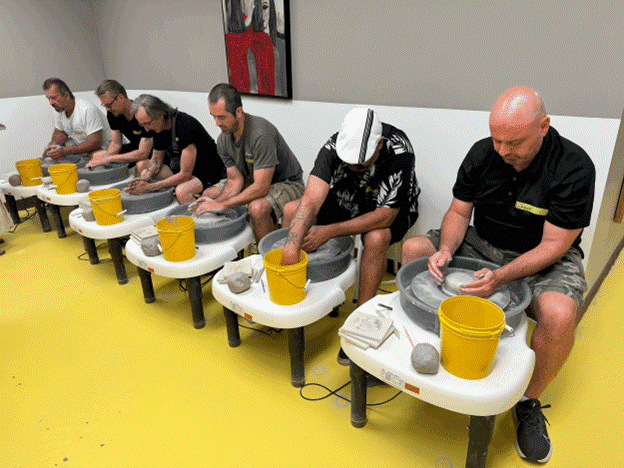By Carmen Shawn
There is no better way to celebrate November than MOVEMBER!
Men are not immune to mental, emotional, and health challenges. At a time of increased isolation because of public health restrictions and working from home, or possibly facing financial crisis from job loss, everybody is subject to increased pressures from this “new normal.”
Movember started in 2003, and was origjnally focused on creating awareness about prostate cancer by encouraging men to grow out their moustaches in all their glory throughout the month of November. The movement has grown to include men’s mental health, suicide, and testicular cancer, and has created quite a buzz around the world. According to the Movember website (ca.movember.com), “We are the leading charity changing the face of men’s health. We know what works for men and what doesn’t.” The movement was inspired by breast cancer fundraising and the degree of public awareness resulting from the focus on that important health issue.
In the same way that the pink ribbon has become universally recognized as the symbol in support of breast cancer, the moustache has become the “face” of the Movember cause. That’s why we see an increased number of men growing mustaches in November; it is a means to bring awareness to men’s health issues and serves as a great platform for fundraising. As a matter of fact, the Burlington Fire Local 1552, who help keep Burlington safe, also has a team of moustache-growers and is in need of donations; to donate, visit https://movember.com/t/BurlingtonFire?mc=1.
Prostate cancer, testicular cancer, and mental health issues are common health crises for men, but we rarely talk about them, which is why Movember is so important. Each of us can help to stimulate dialogue and support affected men in our community — firstly, by understanding the frequency of these issues:
- For males aged 15 to 44 years old, suicide is the second leading cause of death.
- Prostate cancer is the most common type of cancer in men, and cancers (of all kinds) are the leading cause of death for men, making this a major concern in men’s health.
- Testicular cancer is one of the more commonly diagnosed cancers in young men aged 15 to 29. If detected on time, testicular cancer is one of the easiest types of cancer to treat.
With COVID-19 restrictions creating limited access to healthcare at the beginning of the pandemic, diagnostic tests and treatments were interrupted or postponed. There is concern that postponed diagnoses may result in diseases being further along than they might have been otherwise, which can affect treatment plans and outcomes.
Young men with families have lost their jobs because of pandemic shutdowns, are struggling financially or feeling isolated, increasing the possibility of developing mental health issues, and potentially making things harder for those already experiencing mental health issues.
This is why Movember is particularly important this year, and has especially high fundraising expectations.
The Movember website offers a list of 5 things you should know or do to make this difficult time easier for yourself and others:
- Hang out with the people who make you feel good. This can be hard with social distancing protocols in place, but thank goodness for technology! Jump on a video call or do a socially- distanced visit — outdoors if possible, or indoors with masks.
- Talk. It’s hard to ask for help or an ear, but there are people out there who are willing to listen. You can also offer to be that ear, to be there for others. Ask how your friends and family are doing. Let them know that you are always there for them.
- Know the numbers. Know at what ages you should be talking to your doctor about screening tests for prostate cancer. Be aware of the signs and risks.
- Know your own body. Just like women, men need to do self-checks regularly — check your testicles and talk to your doctor if something feels different.
- Move. Movement makes you feel good, especially activities that you enjoy. Go for walks or have your meetings while walking. Get outside and play with the kids. Create a small workout area at home.
Remember — your health matters and we are here to help support you!
Sources:
Canadian Cancer Society and the Government of Canada. Canadian Cancer Statistics, 2019; url: https://www.cancer.ca/~/media/cancer.ca/CW/cancer%20information/cancer%20101/Canadian%20cancer%20statistics/Canadian-Cancer-Statistics-2019-EN.pdf?la=en (accessed Nov. 16, 2020).
Government of Canada, Canadian Cancer Statistics; url: https://www.canada.ca/en/public-health/services/chronic-diseases/cancer/canadian-cancer-statistics.html (accessed Nov. 16, 2020).
Movember Canada, How? Here Are Our Top Five Things to Know, and Do; url: https://ca.movember.com/mens-health/general (accessed Nov. 16. 2020).
Statistics Canada, Leading Causes of Death in Canada, 2009; url: https://www150.statcan.gc.ca/n1/pub/84-215-x/2012001/hl-fs-eng.htm (accessed Nov. 16, 2020).
Testicular Cancer Canada, 2020. All You Need to Know; url: https://www.testicularcancer.ngo/all-you-need-to-know (accessed Nov. 16, 2020).





